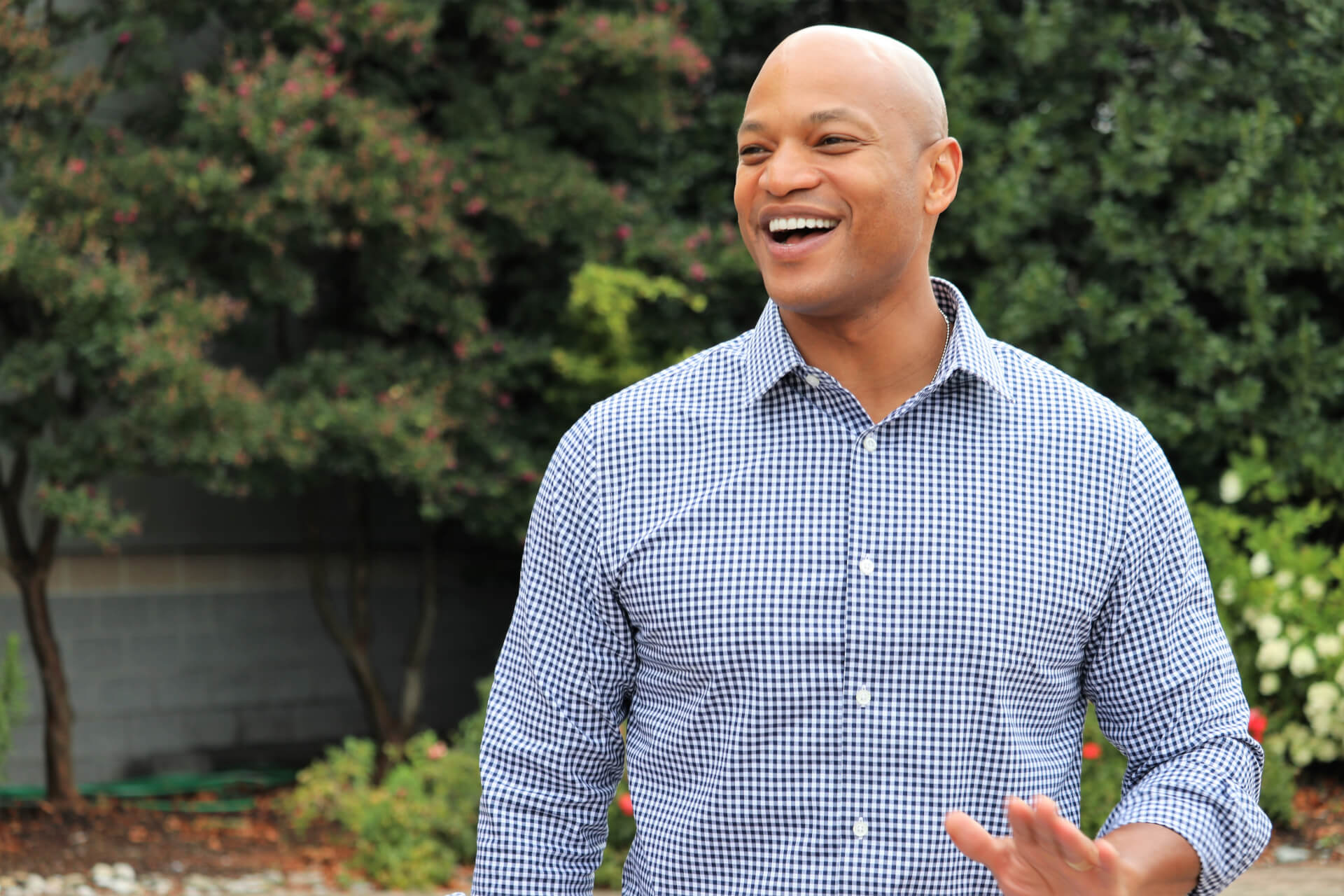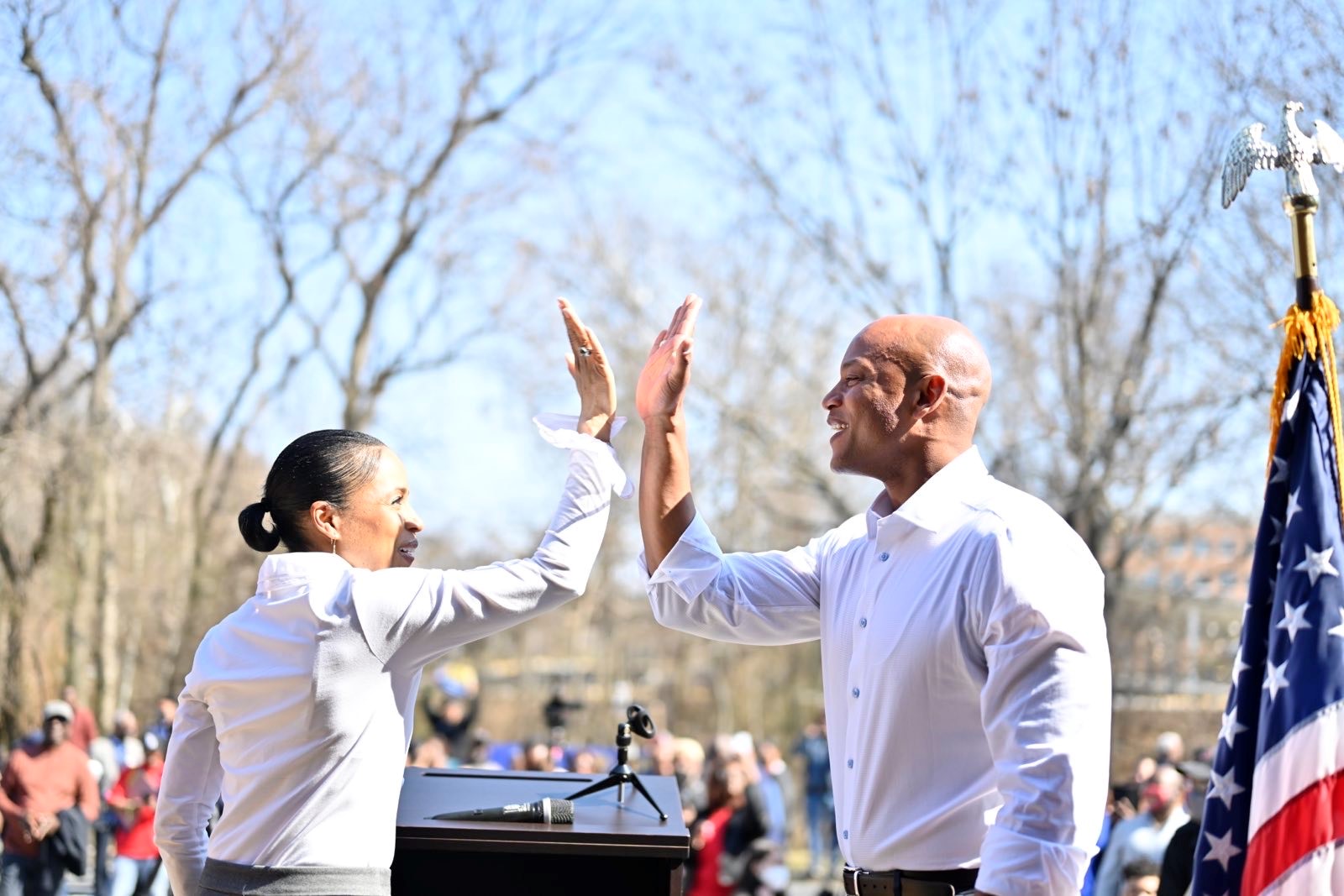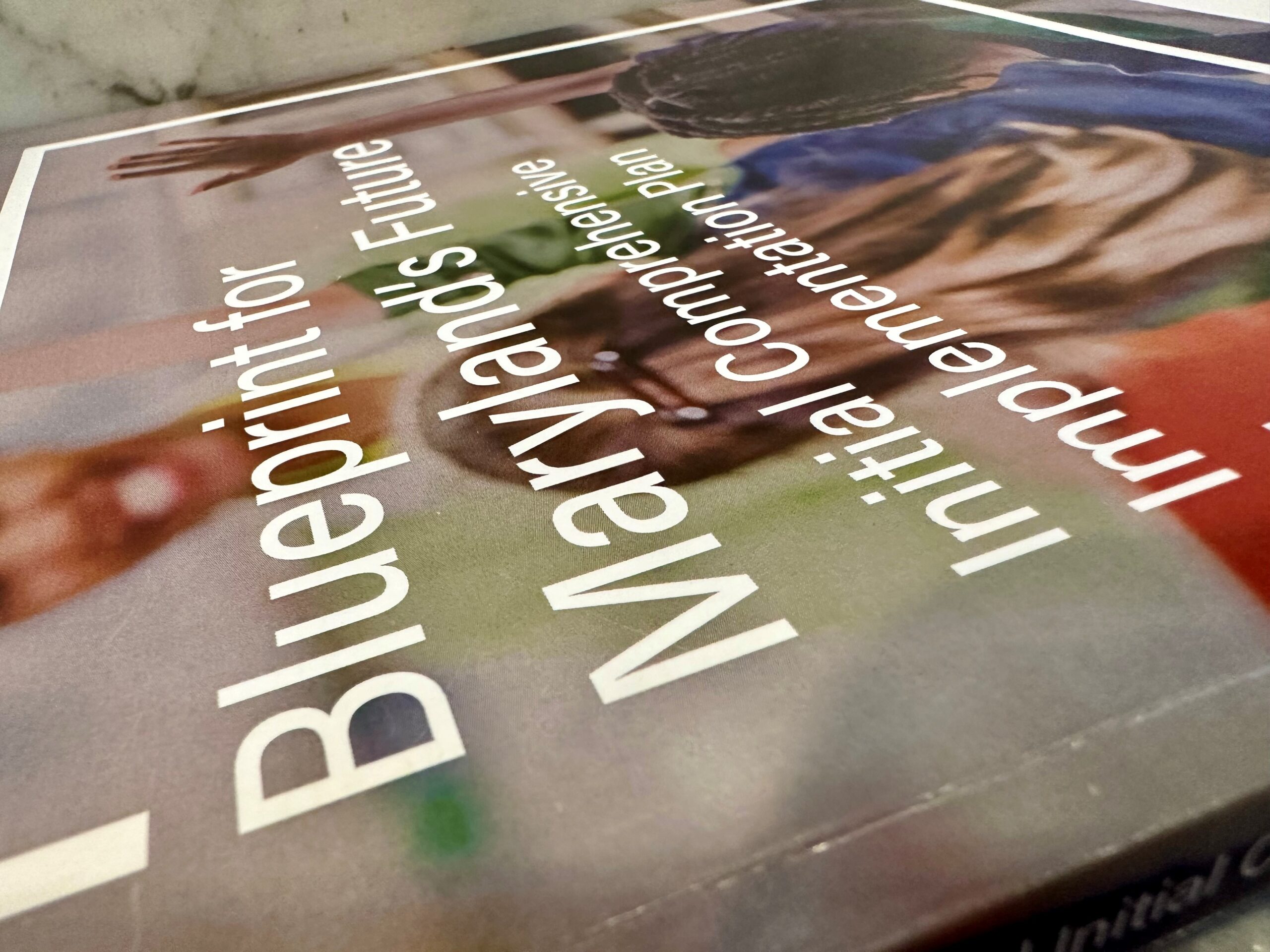Analysis: How Could Wes Moore’s Origin Story Impact Primary Race?

Political candidates tend to exaggerate things.
Maybe they’ll exaggerate about their education or military service. Maybe they’ll overstate the role they played in a consequential legislative debate. Maybe they’ll pretend they know more about a political subdivision than they actually do.
So when CNN released an investigation Wednesday night which suggested that not all of Democratic gubernatorial candidate Wes Moore’s claims of having come of age in Baltimore City checked out, was it really such a big deal?
Very possibly — especially for a candidate whose personal brand is so entwined with his life story. So the question becomes whether the report could slow Moore’s momentum in the nine-candidate Democratic primary — or hurt the best-selling author and former nonprofit CEO if he winds up as the Democratic nominee.
The CNN article may not have penetrated the public consciousness yet, but it was certainly topic A in the Maryland political community on Wednesday night and all day Thursday — even with a pivotal court decision on legislative redistricting handed down on Wednesday and the Friday night candidate filing deadline rapidly approaching.
“In inside circles, it’s all anybody’s talking about,” said one veteran Maryland political strategist.
In summary, the article attempted to fact-check the narrative that has built up around Moore’s from-the-bootstraps upbringing — that he emerged from family tragedy and privation, from the mean streets of the Bronx and Baltimore, to become a soldier, a White House fellow, a Johns Hopkins graduate and a Rhodes Scholar. Specifically, the article suggested that Moore — or at least the friends, allies and media personalities who have helped craft the narrative and guide his career — has exaggerated the time he spent in Baltimore City as a youth.
The basis for the examination was in part Moore’s best-selling 2010 autobiography, “The Other Wes Moore,” which compared his trajectory with another man of the same name and roughly the same age, who wound up incarcerated for murder.
“While his book lays out the basic details of his life factually, a less accurate version of his Baltimore roots has taken on a life of its own, fueled by more than a decade of assertions by other people in TV interviews that he is a Baltimore native, born and raised in the city,” the CNN report said.
“At times, Moore has fed that impression himself. For example, he has repeatedly said that he originally wanted to call his first book ‘Baltimore Sons.’ Other times, he made ambiguous statements about his childhood connections to Baltimore or, in high-profile settings, sat by quietly as others repeated erroneous details.”
The Moore campaign anticipated the report — and the potential fallout — last week, when it filed a complaint with the state prosecutor’s office and the Maryland State Board of Elections, accusing a rival campaign of spreading false information about the candidate. Included in the filing was a dossier of unknown origin that had been circulating in political circles for weeks, laying out some of the accusations about Moore’s biography that emerged in the CNN article. The campaign also set up a website, factsmd.com, to offer its own timeline of Moore’s history.
Still, as a newcomer to politics, whose entire career as an entrepreneur, philanthropist and anti-poverty crusader has been set in motion by his compelling biography, Moore, in the view of some political professionals, could be especially susceptible to the mere suggestion that he’s attempted to shade the truth about his background.
Most other candidates in the gubernatorial election have long political records to draw from, which get blended in their public personas along with their biographies. Moore, who in the words of political analyst Jacob Rubashkin, has “an autobiography that could have been concocted in a laboratory for the perfect political candidate,” does not.
“Because he’s a candidate whose biography has propelled him, he doesn’t have a record to fall back on, he doesn’t have an office to fall back on, and that becomes an issue and a potential vulnerability,” said Rubashkin, a reporter for Inside Elections, a national political tip sheet.
When the Moore campaign released the unflattering information about the candidate last week, his advisers did not try to contextualize the information or fully explain it beyond the new website — leaving CNN to offer its own deeper dive and more high-profile interpretation a week later.
One Moore supporter, state Sen. Antonio L. Hayes (D-Baltimore City), said he does not recall a time when Moore had misrepresented where he was born and grew up, and has only heard Moore say that he “came of age in Baltimore.”
Hayes, a lifelong Baltimore resident, said it is very common for people to claim that they are from the city when they live in the surrounding areas because it helps others understand what they are referring to.
“No one says, “I’m from Takoma Park’ but instead says, ‘I’m from the D.C. area,'” at least if they are outside of Maryland, Hayes said in an interview.
Even if Moore did not spend most of his youth in Baltimore, Hayes said he appreciates having a successful Black man like Moore strongly identifying with the city since “people want to be down on Baltimore” all the time.
Attempts to sabotage someone’s campaign in this way is something that happens often in many political races and is not unique to Moore, Hayes said, although there is usually more scrutiny with Black candidates. And with Moore’s list of accomplishments and his success in the gubernatorial race so far, there is a lot of resentment, Hayes observed. Moore’s campaign has been gaining momentum, with a stellar fundraising performance and an increasing number of high-profile endorsements, including recently from the powerful Maryland State Education Association.
“Especially with Black folks who are aspiring for higher office, the scrutiny is just so microscopic all the time,” Hayes said. To probe whether or not Moore really did grow up in Baltimore is “so miniscule in comparison to the issues that we face in our public safety, the priority of education and health care…that average Marylanders really care about,” he said.
Hayes said the recent allegations motivate him to back Moore even more enthusiastically.
“It’s inspired me to even double down,” he said. “I’m inspired by Wes, I love what he represents as a Black man, as a family man, as a guy who served this country.”
The Gary Hart precedent
Former Colorado Sen. Gary Hart (D) is best known for blowing up his front-running presidential campaign in 1988 with a sex scandal. But it’s his improbable 1984 White House campaign that may be instructive to the Moore situation.
Though he had served in the Senate for a decade by that point, Hart was not an institutionalist or part of the clubby Washington, D.C., social scene. So when he began winning primaries, threatening the campaigns of better known and more seasoned candidates like former Vice President Walter Mondale, Hart’s life story suddenly came under greater scrutiny. It emerged that he had changed his name from Hartpence to Hart, and shaved a year off his age in his official biography.
Michael Stratton, a veteran national Democratic strategist who was a Hart aide during the 1984 campaign, recalled in an interview Thursday that because Hart campaigned on the issue of military reform, there were whispers that he was being controlled by “foreign actors” — which also put him on the defensive. Questions about Hart’s background and authenticity leaked into media coverage and policy debates, prompting Mondale to say that Hart’s proposals reminded him of a line from a popular TV commercial at the time, “Where’s the beef?”
“I think in modern politics the opposition has become very adept at throwing up a lot of mud and seeing whatever will stick,” Stratton said. “It’s hard to sort out this character issue.”
Moore’s opponents in the Democratic primary are loath to say anything publicly about the CNN report, but they are clearly developing their own theories about Moore’s biographical vulnerabilities and how they might be able to exploit them in the weeks ahead. Like Hart’s opponents, they may at some point start to suggest that if Moore has gone along with exaggerations about his life story, he may be dishonest in other ways.
“The danger for Wes Moore is this may be the first thing that a lot of people hear about him, that this defines him before he can define himself,” said Rubashkin, the political analyst (though Moore and three other Democratic candidates have been airing ads for the past few weeks).
Republicans are almost certain to pounce on Moore’s biography if he wins the July 19 Democratic primary. That was certainly the case four years ago, when they attacked the Democratic nominee for governor, Benjamin T. Jealous, another political novice who did not grow up in Maryland, as an outsider.
Doug Mayer, a strategist for Gov. Lawrence J. Hogan Jr. (R) who is now advising the gubernatorial campaign of former Maryland Commerce Secretary Kelly M. Schulz (R), said Moore’s “good life story” has been obscured by some of the conclusions in the CNN article. He was sharply critical of the fact that the CNN account features a statement from Moore’s mother about his upbringing, while the candidate himself refused to go on the record.
“I don’t know what’s more pathetic — lying about your life for a decade or rolling out your mommy to defend you when you get caught,” Mayer said.
Moore campaign on defense and offense
Outwardly, sources within the Moore campaign do not appear to be sweating the questions about the candidate’s biography. They don’t believe the news is penetrating with average voters, and they predict many people will be offended that Black candidates appear to face greater scrutiny than others. They compare Moore’s treatment to the “swift boating” of John F. Kerry during the 2004 presidential election or the calls for President Obama to produce his birth certificate.
“He’s given hundreds of interviews over the years,” said one Moore adviser. “If the worst thing that people are going to say about him is that he failed to correct an Oprah Winfrey voiceover [about his life story], he’s going to be fine. There are a lot of issues that people care about, and I’d be shocked that this would be one of them.”
Yet it isn’t just TV interviewers who might misrepresent Moore’s background. His 2020 book, “Five Days,” which chronicles the unrest in Baltimore following the death of Freddie Gray in 2015, features this biographical information on the book flap, “Moore appears regularly as a commentator on NBC News. He lives in his hometown of Baltimore with his wife and two children.”
Media reports can be slightly inaccurate in incalculable ways.
Earlier this week, WJLA-TV ran a report about some of gubernatorial candidate Tom Perez’s recent endorsements that included the suggestion that Obama was backing Perez in the gubernatorial primary. A TV ad that Perez is running features Obama showering praise on him after he wrapped up his stint as U.S. Labor secretary, but there has never been any endorsement from the former president and Perez has never implied that there has been one. The Perez campaign said it moved to correct the record, and on Friday morning, the online version of the story was finally updated.
Del. Stephanie M. Smith (D-Baltimore City), the first legislator to support Moore for governor, said that accusations about Moore are the aspects of politics that voters find “dispiriting.” Smith said Moore has been “very candid” about where he was born and raised and that his years of connection and real-life experience in the city is not something to be minimized.
Even if Moore did not spend his whole life in Baltimore, that does not take away from his origin story, which is deeply connected to living in urban America, Smith asserted.
“Whether it’s the Bronx or Baltimore, his family had to pull together,” she said. “If anything, reminding people of this will only resonate with people who have had similar hardships in their life.”
In politics, Smith added, “it’s not always about where you’re from, it’s about where you’re at.”
And yet, in a race where there are so many candidates and so many variables, any spate of negative publicity can have a meaningful impact on the outcome, Rubashkin said. “Even slight fluctuations can have an outsized influence.”
Danielle E. Gaines contributed to this story.
Editor’s note: This story has been updated to reflect that a WJLA-TV report about Tom Perez had been updated.





 Creative Commons Attribution
Creative Commons Attribution